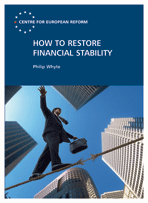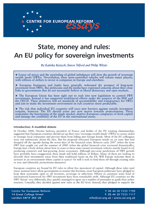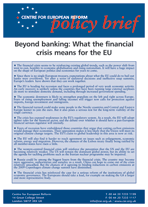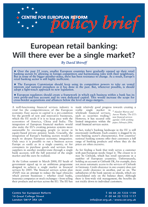Financial services & regulation
Why an EU financial transactions tax is a red herring
26 January 2012
Ever since it was first mooted in the 1970s, a financial transactions tax (FTT) has often been thought of as an interesting idea that cannot work in practice (because it needs to be adopted universally if it is not to be undermined by tax arbitrage). In other words, the difficulty...
Britain, the City and the EU: A triangle of suspicion
11 October 2011
Britain has abandoned 'light touch' regulation and signed up to greater supervisory powers at EU level. Yet the Channel looks as wide as ever.
Financial regulation: Britain the perennial outlier?
20 June 2011
Back in 2007, when the Labour government had abolished the business cycle and the City of London was booming, British policy-makers liked to vaunt the merits of ‘light touch’ regulation.
Financial regulation: Will British euroscepticism collide with European populism?
21 May 2011
When EU finance ministers met in Brussels on 18 May, many observers expected sparks to fly. The reason? This was the first EU meeting that Britain’s newly-elected government would attend.
The EU's new supervisory architecture - evolution or revolution?
01 October 2010
In early September EU finance ministers approved the Commission's proposals for reforming the EU's supervisory architecture for financial services.
How to restore financial stability
12 January 2010
In 2008, the global financial system came close to collapse. Ever since, policy-makers have been busy overhauling the way it is regulated and supervised. Will this flurry of activity produce a more stable financial system – and if it does, at what cost?
Anglo-Saxons and hedge funds: Culprits or scapegoats?
07 August 2009
Disasters often provoke unseemly bouts of finger-pointing. This has certainly been true of the global financial crisis. In the Anglo-Saxon world, libertarians have blamed it on governments, and governments on ‘bankers’.
The G20 summit – a distraction?
03 April 2009
The good news first. The summit delivered more than expected. The trebling of the funds available to the IMF goes well beyond anything expected and is very welcome.
The Europeans at the London summit
01 April 2009
Christine Lagarde, the French finance minister, threatens to walk out of the London G20 summit unless France gets its way on tougher financial regulation. The toppled Czech Prime Minister, Mirek Topolanek, who happens to hold the EU presidency, describes the US fiscal stimulus as “the road to hell”. Not one EU leader deems it necessary to support Gordon Brown publicly when he tries to drum up support for a more concerted international effort to revive the global economy.
The real G20 agenda
13 March 2009
Finance ministers from the G20 countries are meeting in London this weekend to prepare for the global economic summit at the start of April. Expectations are high. But what will the summit be about?
Financial regulation: Is the Channel narrowing?
27 February 2009
On February 25th 2009, a Commission-appointed taskforce headed by Jacques de Larosière published its much-awaited report on financial supervision in the EU.
State, money and rules: An EU policy for sovereign investments
01 December 2008
The debate about sovereign wealth funds will return as global growth and commodity prices recover. European governments have been right to reject new EU rules on SWFs, and instead support multilateral efforts to set voluntary standards.
Beyond banking: What the financial crisis means for the EU
23 October 2008
The world is in the midst of a financial crisis which will have far-reaching implications for the EU – not just for the region's immediate economic outlook, but also for the future of the euro, financial regulation, economic reform and global governance.
Scapegoating the US lets others off too easily
02 October 2008
Huge amounts have been said about the consequences of the credit crunch for the US and UK economies. They undoubtedly face major adjustments, and several years of very weak economic growth.
In defence of Anglo-Saxon capitalism
29 September 2008
Those who never liked ‘Anglo-Saxon’ capitalism are feeling smug. Marxists, fans of ‘Rhineland’ capitalism and those who simply cannot stand American power are crowing.
Issue 61 - 2008
25 July 2008
- Three scenarios for the Lisbon treaty, Charles Grant
- A new European mercantilism?, Simon Tilford
- The next US president should forget the League of Democracies, David Hannay
A joint response to the credit crunch
19 March 2008
Ailing banks are being rescued, markets remain frozen, economic numbers are becoming gloomier. Of course, central banks and governments are focusing on fire-fighting, on cutting interest rates, on providing cash to liquidity-starved banks and to consumers.
European retail banking: Will there ever be a single market?
03 December 2007
Integrated markets for entertainment and communications, as well as nearly all goods, stretch from the Arctic to Cyprus. By contrast, Europe’s retail banking industry remains largely segmented along national lines.
Issue 56 - 2007
28 September 2007
- What should Europe do about sovereign wealth funds?, Katinka Barysch, Philip Whyte
- Yes to a referendum, but not on this treaty, Hugo Brady
- Transatlantic relations after Bush, Kori Schake
Britain and Europe: A City minister's perspective
18 May 2007
Britain's membership of the EU strengthens London as a global financial centre, argues City Minister, Ed Balls. The UK should engage actively with the EU, to ensure that its financial regulation is proportionate, flexible, and implemented effectively.


























